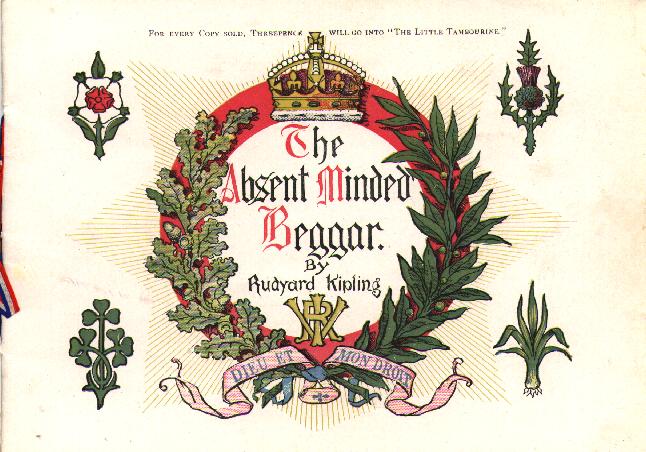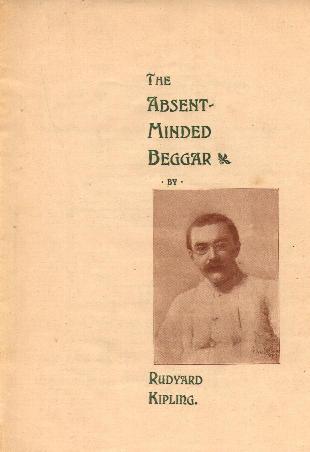
The Absent Minded Beggar -
An introduction

On the outbreak of the Boer War thousands of troops mobilised to go to South Africa, while many thousands of men enlisted in the colours in order to fight for 'Queen and Country'. Those who did not join often showed their patriotic support for the war, by contributing to the numerous charities which sprang up. Initially they sought to send relief to British refugees who had fled the Transvaal and were living in refugee camps in the Cape, but other worthy causes were soon added principally support for the families of men in the field and to send comforts to the troops.
A number of these funds were organised by newspapers, both national and provincial. Considerable sums were raised in this way. ?254,000 was raised by readers of the Daily Telegraph alone, while the Birmingham Daily Mail collected ?55,000. One of the largest however was organised by the Daily Mail .
The Mail was the first of a new
breed of populist newspapers. It was launched by Alfred Harmsworth (later Lord
Northcliffe) in 1897. Although its detractors sniffed that 'it was written by
office boys for office boys' The Daily Mail was the first newspaper in Britain that catered for a new reading public that needed something simpler, shorter and more readable than those that had previously been available. One new innovation was the banner headline that went right across the page. Considerable space was given to sport and human interest stories. It was also the first newspaper to include a woman's section that dealt with issues such as fashions and cookery.
The newspaper was an immediate success and circulation quickly achieved 500,000. With the strong interest in the Boer War in 1899 sales went
to over a million. Harmsworth encouraged people to buy the Daily Mail
for nationalistic reasons making it clear to his readers that his newspaper stood "for the power, the supremacy and the greatness of the British Empire".
Overwhelmingly sentimental and patriotic articles were carefully pitched at this readership. He also pioneered the use of photographs and a more approachable design. The patriotic surge released on the declaration of war particularly amongst the working classes proved a golden opportunity for the newspaper. Harmsworth was a salesman of genius and he used his talents to push the newspaper's war fund.
 His first stroke of genius was to commission a poem from the foremost poet of the day - Rudyard Kipling (1865-1935). He first asked Kipling to become a war correspondent in South Africa, but the invitation was declined. Instead, on 16 October 1899, Kipling penned this poem and gave it to Harmsworth to do as he liked. Although now almost forgotten, The Absent Minded Beggar proved to be an instant success with the British public, indeed it
becam eopular around the world. So much so, that Kipling later said that he
wished he had never written it, although he took a modest pride in his ability
to raise money to help the '3rd class carriages' as he called them.
His first stroke of genius was to commission a poem from the foremost poet of the day - Rudyard Kipling (1865-1935). He first asked Kipling to become a war correspondent in South Africa, but the invitation was declined. Instead, on 16 October 1899, Kipling penned this poem and gave it to Harmsworth to do as he liked. Although now almost forgotten, The Absent Minded Beggar proved to be an instant success with the British public, indeed it
becam eopular around the world. So much so, that Kipling later said that he
wished he had never written it, although he took a modest pride in his ability
to raise money to help the '3rd class carriages' as he called them.
England's most famous composer Sir Arthur Sullivan soon set the piece to music. Kipling said that it was 'guaranteed to pull teeth out of barrel organs.' Not it has to be said his best composition by far, if you listen here.
Within weeks Absent Minded Beggar fever gripped the country. It was constantly being recited in theatres and music halls. The Times reported on 30 November 1899, that:
In order to help to swell the funds now being raised for the widows and orphans of those taking part in the war in South Africa, Mrs Beerbohn Tree has consented nightly to recite Mr R Kipling's poem 'The Absent Minded Beggar'. Mrs Tree's fee for doing so, £100 per week, the whole of this without deductions she will hand over to the Fund.
Mrs Beerbohn Tree was one of England's most popular actresses.
The influential, but very conservative Charity Organisation Society predictably took a dim view of the excitement. In the issue of its Charity Organisation Review in November 1899 it said that the Absent Minded Beggar was the Most prominent figure on the charitable horizon at present. This was at the expense of other more reputable charities.
The fuss soon died down, but the Absent Minded Beggar continued his good work during the war. This was Harmsworth's other stroke of genius. Instead of collecting for the families and widows of men at the front which many other newspaper appeals did, his fund concentrated on the fighting man himself, many of whom might have been the paper's readers.
The Absent Minded Beggar Relief Corps was set up by Daily Mail to aid wounded soldiers and sailors and their families on their return to England; to send medical supplies and comforts to South Africa; to meet gaps where the War Office and Army fall down, for example, by providing hot drinks to soldiers arriving at ports or providing clothes for wounded men on their return to England. This human touches were described in detail in the paper and excited much compassion and donations from readers. By March 1900, the fund had collected nearly £100,000. So much indeed was collected that the Daily Mail was able to open and run a convalescent home at Alton, Hampshire. All in all £250,000 was raised in total.
The poem is reproduced here.
Copyright 2001. All rights reserved